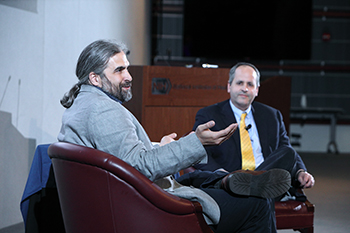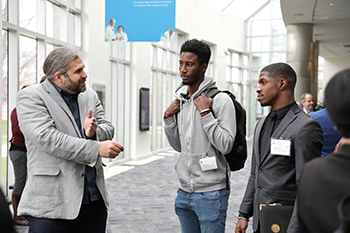The Training Page
Advice from an Early Career Investigator
“Embrace being wrong.” Rather than feeling discouraged when an experiment yields unexpected results, try to understand what happened and why. That’s how science advances.

PHOTO BY CHIA-CHI CHARLIE CHANG
University of Kentucky biologist Jeramiah Smith (left) offered career advice to undergraduate students from Morgan State University at the NIGMS Director’s Early Career Investigator Lecture hosted by NIGMS Director Jon Lorsch (right).
Jeramiah Smith gave this and other career advice to the undergraduate students from Morgan State University (Baltimore, Maryland) who attended his lecture on April 17, 2018. Smith, a biologist from the University of Kentucky (Lexington, Kentucky), delivered the third annual National Institute of General Medical Sciences (NIGMS) Director’s Early Career Investigator Lecture. NIGMS established this lecture series three years ago to highlight the achievements of early-career grantees and to encourage undergraduates and other students to pursue biomedical research careers.
After his lecture, Smith answered questions from the students about pursuing a career in laboratory research.
Among Smith’s other tips:

PHOTO BY CHIA-CHI CHARLIE CHANG
Smith (left) offered more career advice to the Morgan State students as he chatted informally with them.
- If you’re interested in doing lab research, don’t wait until your senior year in college. It takes a while to learn the lab techniques, so if you start as a freshman or sophomore, you’ll have more time to actually do your own research.
- Before asking a professor or lab chief whether you can work in his or her lab, do some homework: Read one or more articles by the research group. Have an idea of relevant research questions. “If a student has read your work and has an idea, especially something they would be interested in pursuing, even if it needs to be further shaped, that means a lot in terms of my perception.”
- Make an appointment to see the lab chief. Show up. On time.
- Keep asking questions. “You tend to be more limited by your ability to address questions than by the number of questions there are to address. It’s great, it’s job security in a sense.”
The archived videocast includes the entire lecture and the Q & A session afterwards: https://videocast.nih.gov/launch.asp?23827.
This page was last updated on Thursday, April 7, 2022
